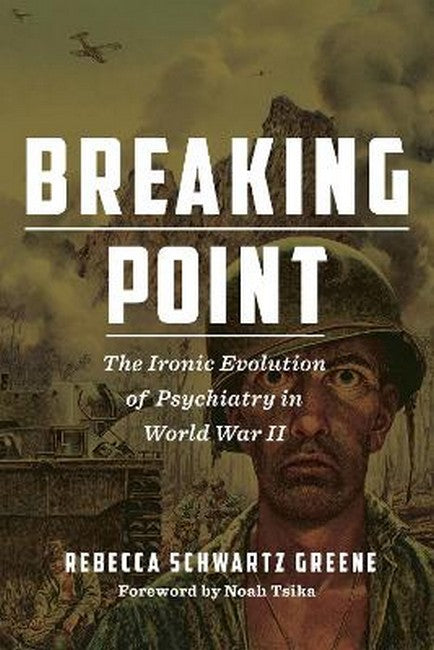Rebecca Schwartz Greene (Author) Rebecca Schwartz Greene is Visiting Scholar at Seton Hall University in South Orange, New Jersey. She is a historian who specializes in American social history, history of medicine, and modern American history. Noah Tsika (Foreword By) Noah Tsika is a professor of media studies at Queens College, City University of New York. He is the author of Traumatic Imprints: Cinema, Military Psychiatry, and the Aftermath of War, among other books.
Request Academic Copy
Please copy the ISBN for submitting review copy form
Description
List of Illustrations ix Foreword by Noah Tsika xi Preface xv Introduction 1 Part I: Before the War 1. Mobilizing for War 13 2. Military Necessity Overrides Psychiatric Skepticism 34 3. Debating Screening's Viability 46 Part II: During the War 4. Psychiatric Policy Making in the Throes of War 77 5. The Public Reaction 101 6. The Response of Psychiatrists 120 7. The Horrors of War and Beginnings of Change 138 8. From Prediction to Prevention 153 9. Limits to Prevention and Treatment 177 Part III: After the War 10. Return to Normalcy 209 11. From "War Man" to "Peace Man" 232 Conclusion 247 List of Acronyms and Abbreviations 253 Principal Physicians and Social Scientists 255 Appendix A: Medical Circular No. 1 275 Appendix B: Circular Letter No. 19 277 Appendix C: Key Investigations of Military Psychiatry 279 Acknowledgments 281 Notes 287 Select Works 405 Index 441
. . . [T]his book's greatest achievement is that it will force readers to grapple with a tension baked into all military medicine--between physicians' Hippocratic Oath to prioritize individual care, on the one hand, and the pressure to serve the wartime state, on the other.-- "Journal of Military History" Rebecca Schwartz Greene brings to light intricate details of the history of psychiatry in WWII, describing its numerous faults, setbacks, and occasional victories, and how they led to a stunning rise in prominence of the field of psychiatry, broadly expanding the role psychiatry played in society, marking this as a moment where the field began to define an expertise in a much wider array of ailments, and began searching for treatments to help heal wounds of war, which in turn influenced the assessment and treatment or anxiety, depression, etc. She provides an essential narrative and perspective on the history of military psychiatry and psychiatry generally.-- "Psychiatry: Interpersonal & Biological Processes" [Greene] has done a commendable job, pulling together published and unpublished material, including first-person accounts and personal interviews. . . This author has undertaken a painstaking and groundbreaking research process, producing an "instant classic," but one that will be read and cited for decades to come. Highly recommended.-- "Choice Reviews" . . . [A] first stop for scholars wanting to do further research on particular aspects of psychiatry at war. Greene's work is (still) the most focused account of American psychiatry and World War II.-- "Journal of the History of the Behavioral Sciences" By giving equal attention to both the successes and failures of psychiatry in this era, Greene's Breaking Point provides a solid, well-researched piece that benefits a wide audience, from the scholar to the general reader. With World War II veterans, as well as psychiatric professionals, passing away in increasing numbers, Greene's book serves as an invaluable source, preserving the experiences of the era with much-needed context of the state of the field in the following conflicts and up to the present day.-- "H-Net Reviews" From the creation of the psychiatric exam for draftees and volunteers to the use of hypnosis and other therapies to treat casualties of combat exhaustion and fear in North Africa, Europe and the South Pacific, and what would later be called PTSD, Breaking Point exposes the conflicts and compromises among American psychiatrists in World War II. Anchored in extensive research, including interviews with military psychiatrists from that war, Rebecca Schwartz Greene provides a path-breaking account of the successes, failures, and ironic contributions of American psychiatry during World War II and in the post-war popular culture.---John Whiteclay Chambers II, Distinguished Professor Emeritus of History, Rutgers University, and editor-in-chief of The Oxford Companion to American Military History. Rebecca Greene's Breaking Point is a signal achievement, providing, for the first time, an accessible history of World War II psychiatry and the lengths to which the US government went to prevent and mitigate the "unseen wounds" of combat. Breaking Point is essential reading not only for historians of World War II, but for anyone concerned at all with the human costs of war, borne in minds as well as bodies, shielded for the most part from public view, and not unique to this conflict certainly as the rate of suicide among veterans of the Iraq and Afghanistan wars, tragically and alarmingly, attests.---Edward J.K. Gitre, Assistant Professor of HIstory at Virginia Tech, and project director and editor, The American Soldier in World War II

